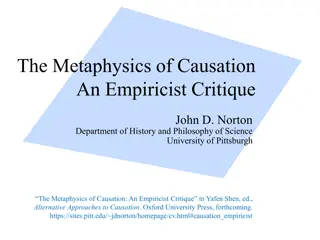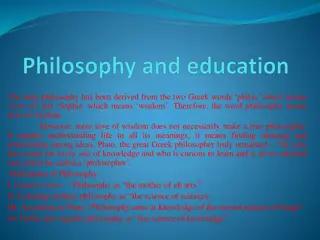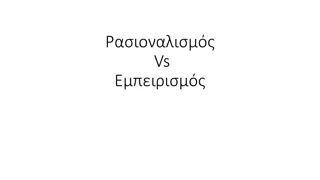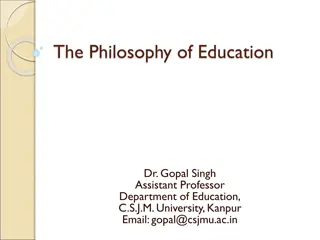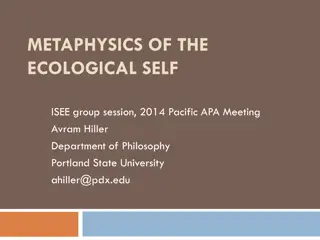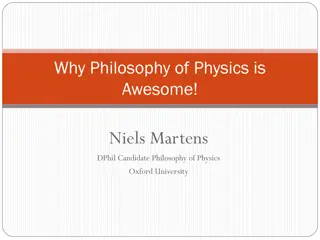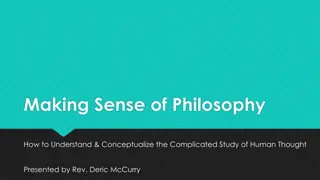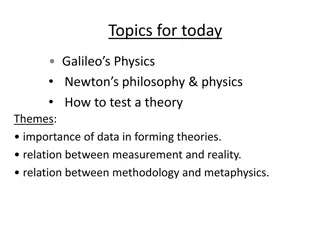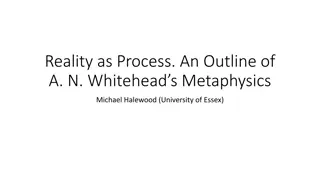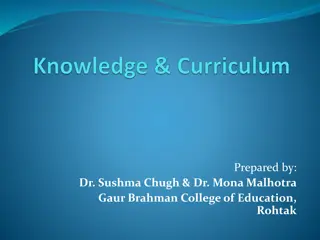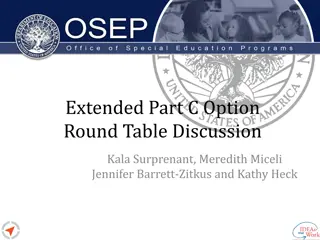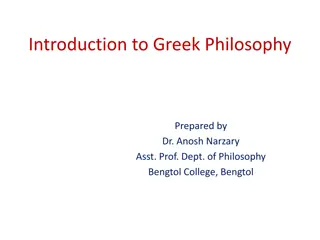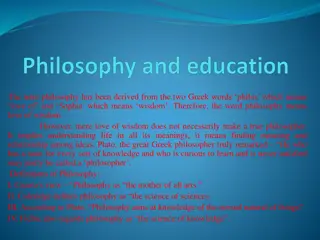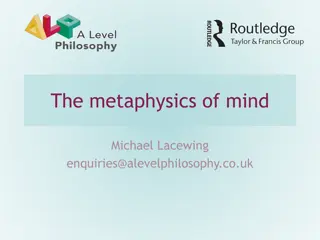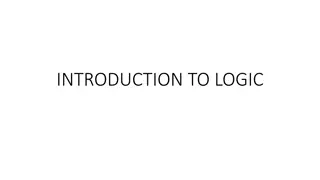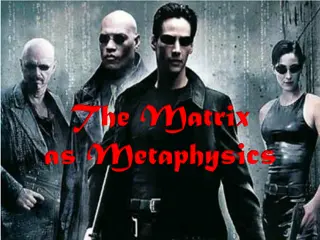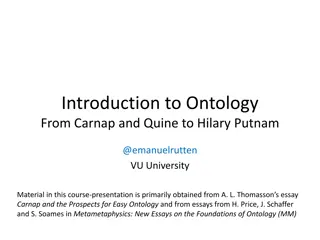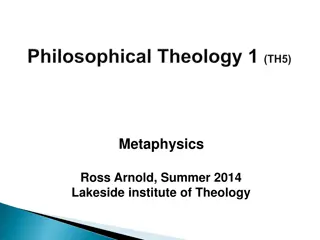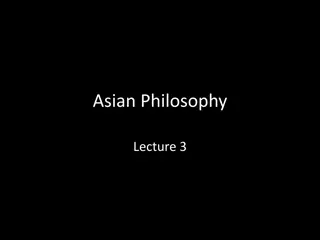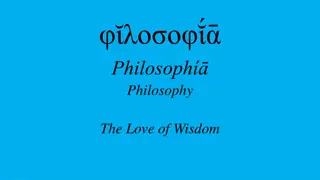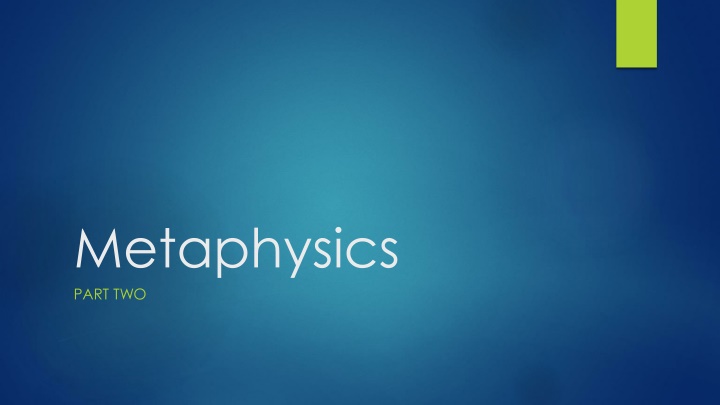
Exploring Metaphysics: Regress and Absurdity in Philosophy
Delve into the realm of metaphysics through an examination of methodology, circular regress, and infinite regress. Explore the concepts of regress and absurdity, including the Reductio Ad Absurdum approach. Discover the philosophical perspectives of notable figures like St. Thomas Aquinas and their views on reconciling faith and reason.
Download Presentation

Please find below an Image/Link to download the presentation.
The content on the website is provided AS IS for your information and personal use only. It may not be sold, licensed, or shared on other websites without obtaining consent from the author. If you encounter any issues during the download, it is possible that the publisher has removed the file from their server.
You are allowed to download the files provided on this website for personal or commercial use, subject to the condition that they are used lawfully. All files are the property of their respective owners.
The content on the website is provided AS IS for your information and personal use only. It may not be sold, licensed, or shared on other websites without obtaining consent from the author.
E N D
Presentation Transcript
Metaphysics PART TWO
Regress & Absurdity Methodology Circular Regress Infinite Regress Introduction Defined Form & Examples A requires A A requires B, B requires C Z requires A Job-Experience Defined Form 1 requires 2 2 requires 3 3 requires 4 X requires X+1 Evil Bureaucrat Regresses & Absurdity
Regresses & Absurdity Reductio Ad Absurdum (Reducing to Absurdity) Defined Form #1 Assume P is true. Prove that assuming P leads to something false, absurd or contradictory. Conclude that P is false. Form #2 Assume P is false. Prove that assuming P is false leads to something false, absurd or contradictory. Conclude that P is true. Example
Regresses & Absurdity Using a regress in a Reductio Ad Absurdum Introduction Example
St. Thomas Aquinas Background (1224-1274) Early Life Son of the count of Aquino Imprisoned in a tower Albert the Great Eastern Orthodox Church Mystic Experience Canonized in 1323 1879 Pope Leo XIII This Photo by Unknown Author is licensed under CC BY-ND
St. Thomas Aquinas The Ox Nickname The flying Cow Works 25 Volumes Summa Theologica
St. Thomas Aquinas Aristotle & Aquinas Complete Works 12th-13th Century: the complete works of Aristotle became available in Europe. Aristotle s works presented a systematic and developed philosophy. Conflict Aristotle: the world is eternal and uncreated. Apparently did not accept personal immortality. Ibn Rushd s commentaries on Aristotle Neo-Platonism Aquinas View Aristotle s view could be adopted without heresy. Regarded Aristotle as a rich intellectual behavior. The Philosopher. Aristotle as a pagan lacking divine revelation.
St. Thomas Aquinas Shift from Plato to Aristotle Platonic notions of the eternal & other worldliness. Aristotle s works presented a systematic and developed philosophy. Faith & Reason Reconciliation: Augustine Sin damaged reason Grace Faith as necessary condition for philosophical understanding Reconciliation: Aquinas Sin did not cripple our rational facilities Reason as autonomous source of knowledge Distinguishes between philosophy & theology Two sources of knowledge Theology yields knowledge via faith & revelation Philosophy yield knowledge via reason and experience
St. Thomas Aquinas Aquinas Epistemology & Metaphysics Epistemology Aristotle s Influence Blank slate No innate knowledge Senses provide reason with content Intellect Intellect Passive & active Passive operations Objects of experience Active aspect Potential Natural process
St. Thomas Aquinas Metaphysics: Hierarchy Actuality & Potentiality Prime matter-potentiality Forms-actuality God-pure actuality Change Great Chain of Being Hierarchy Variety Angels Knowable Purpose Objective Values
St. Thomas Aquinas Metaphysics: Existence & Essence Essence & Existence Essence Existence God His essence entails He exists God Necessity Rejection of ontological argument Empirical experience
St. Thomas Aquinas The First Way (the Way of Motion) Some things are in motion Whatever is moved is moved by another Potentiality A thing moves Reduction from potentiality to actuality Fire Actuality & potentiality in different respects Hot Cold Impossible to be both moved and mover. Whatever is moved is moved by another Moved by another
St. Thomas Aquinas: Five Ways Moved by another This cannot go on to infinity No first mover No other mover Moved by first mover Staff First mover This everyone understands to be God
St. Thomas Aquinas The Second Way ( Efficient Cause) Order of efficient causes Nothing can be the efficient cause of itself Not possible to go on to infinity Efficient causes following an order First Intermediate Take away the cause If no first cause, then neither intermediate nor ultimate If it is possible to go on to infinity No first efficient cause No ultimate effect No immediate efficient causes Plainly false First efficient cause to which everyone gives the name God.
St. Thomas Aquinas The Third Way (Possibility & Necessity) Possible to be and not to be Impossible for these to always exist One time there was nothing Nothing would exist now Impossible for anything to have begun to exist Thus now nothing would be in existence There must exist something whose existence is necessary Every necessary thing either has its necessity cause by another or not Impossible to go on to infinity As per efficient causes Therefore we must admit the existence of a being Having of itself its own necessity Not receiving it from another Causing necessity in others This all men speak of as God
St. Thomas Aquinas The Fourth Way (Gradation) Among beings are some more and some less More or less are predicated by resemblance to a maximum There is something truest, best, noblest There is something most in being The maximum in any genus is the cause of all in that genus Fire There must be something which is the cause of being, goodness, perfection This being we call God
St. Thomas Aquinas The Fifth Way (Governance of the World) Things that act from knowledge act for an end Evident from acting in the same way Whatever lacks knowledge must be directed Therefore some intelligent being directs all natural things This being we call God
St. Thomas Aquinas: Five Ways Common Mistakes in Interpreting the 5 Ways Everything must have a cause Does not assume this What is potential must be cause by what is actual Created beings The world has a beginning in time Does not attempt to prove this Does not disprove Aristotle s eternal world and unmoved mover Possibility of an eternal universe First cause Eternal flame God as a continuously sustaining cause Not possible to prove an eternal world St. Bonaventure Beginning in time Revelation, not proof
St. Thomas Aquinas: Five Ways Common Criticisms Five beings Five different beings Being distinguished by qualities Perfect and unlimited being Two perfect beings would be identical Cannot be two unlimited beings And this everyone understands to be God Different from the personal God Not a complete view of God Important qualities Way of gradation
Rene Descartes (1596-1650) Background Life & Works Life Works Agenda Motivation Travel Inward Focus Goals
Rene Descartes Method Methodology Mathematics Intuition Deduction The Meditations on First Philosophy
Rene Descartes Fifth Meditation The Proof 1. I have the idea of a God that possess all perfections. 2. Existence is a kind of perfection. 3. If the God I am thinking of lacked existence, then He would not be perfect. 4. Hence, if I can have the idea of a perfect God, I must conclude that existence is one of His essential properties. 5. If existence is one of God s essential properties, He must exist. 6. Therefore, God exists.
Rene Descartes Fifth Meditation Unique to God 1. No other being has existence as part of its essence. 2. Aside from God, we can have an idea of a being without that being actually existing. 3. Since existence is part of God s perfection, it is a contradiction to deny his existence. 4. This argument is a variation of St. Anselm s ontological argument. 5. This argument was criticized by Kant on the grounds that existence is not a property.
Immanuel Kant Background Personal information Contributions Philosophical Motivations & Goals Leibnizian rationalism Assumptions First Goal: clarification of the foundations of science Experience Second Goal: Resolve the conflict between science & religion, morality and freedom. Third Goal: Deal with the crisis in metaphysics
Immanuel Kant Theory of Knowledge Critical Philosophy Critiques Copernican revolution Reality Varieties of judgment Analytic judgments Synthetic judgments A priori knowledge A posteriori knowledge
Immanuel Kant Theory of Knowledge Analytic a priori Analytic a posteriori Synthetic a posteriori Synthetic a priori Mathematics Geometry Goal: how synthetic a priori judgments are possible in math, physics, and morality.
Immanuel Kant Theory of Knowledge The Transcendent Method Rejection of empiricism The transcendent method Space & time Space Time Mathematics
Immanuel Kant Theory of Knowledge Categories of the Understanding Knowledge from sensibility & understanding Knowledge is from sensibility& understanding in tandem Concepts
Immanuel Kant Theory of Knowledge 12 a priori concepts Quantity: unity, plurality, totality Quality: reality, negation, limitation Modality: possibility-impossibility, existence-non-existence, necessity- contingency
Immanuel Kant Metaphysics Phenomena & Noumena Introduction Phenomena Noumena Difficulties
Immanuel Kant Metaphysics Transcendent Illusions of Metaphysics Third Faculty: Reason Transcendental ideas Self Cosmos God Problem: application of categories beyond borders
Immanuel Kant Metaphysics The Self The self No impression of self Empirical self Transcendental self The self of psychology
Immanuel Kant Metaphysics The Cosmos The cosmos The failure of reason The antimonies First The world has a beginning in time & occupies finite space The world has no temporal beginning & is spatially & temporally infinite
Immanuel Kant Metaphysics Second All things can be analyzed into basic components Nothing can be analyzed into basic components Third Some events are free and not determined No events are free and all events are determined
Immanuel Kant Metaphysics Fourth A necessary being exists There is no necessary being The argument Kant s resolution
Immanuel Kant Ontological Argument Can conceive of a perfect being The conceivable is possible Possible a perfect being exists If PB exists, then has all perfections Existence is a perfection If PB exists, then it has existence Possible that a PB necessarily exists Absurd Thus a perfect being must exist of necessity Kant s First Refutation of the Ontological Argument Concept of God includes concept of absolutely necessary being Compares to nature of a triangle Does not show triangles exist If God, then being exists necessarily-deniable. Cannot go from concept to existence.
Immanuel Kant Second Refutation of the Ontological Argument Existence is not a predicate Existence is not a property that adds to the concept of X If existence is not a property, then it cannot be an essential part of God s concept Merchant analogy The Cosmological Argument A necessarily existing first cause Assumes the principle that everything has a cause The principle only applies to the realm of experience Defects of the ontological argument The Teleologicial Argument Intelligent designer Praise Design imposed on pre-existing matter Need for cosmological argument
Immanuel Kant Conclusion Attempts to prove God s existence are fruitless Impossible to prove God does not exist Theist and Atheist cannot know Possibility of basing religion on practical or moral faith To deny knowledge in order to make room for faith.
Immanuel Kant Metaphysics Pure Reason Theology & metaphysics Legitimate use What does it mean?
Immanuel Kant Metaphysics Pure Reason Theology & metaphysics Legitimate use What does it mean?
The Problem of Universals The Problem of Universals Introduction Plato & Aristotle Universal Speech & Thought Metaphysical nature of universals Thales: The Problem of the One & the Many 624-545 B.C. Sought to find the unity underlying the diversity of the world. Determining the basic principle that accounts for everything.
The Problem of Universals Tokens & Types Type Token The problem: in virtue of what does a specific token fall under a type? In virtue of what is token a of the type F? Realism Defined Universals are real & exist in the world. Universals are immaterial Separate from sensible objects or not John Scotus Erigena St. Anselm William of Champeux
The Problem of Universals Scholasticism Charlemagne Scholastics Dominant Scholastic Formulation of the Problem Boethius s translation of Porphyry s introduction to Aristotle s Categories. Question 1: Do universals exist as metaphysical entities or only in the understanding? Question 2: If universals exist as metaphysical entities are they material or immaterial? Question 3: If universals exist as metaphysical entities are they separate from sensible objects or not?
The Problem of Universals Epistemic Motivation Aristotle s logic Reasoning Knowledge Correspondence between reality & logic. Scholastic Theological Motivation: Original Sin Original sin Odo of Tournai Human sin Shared universal Scholastic Theological Motivation: Trinity Trinity Divine essence as single universal
The Problem of Universals Problem Humanness falls under the universal mammal All universals are subsumed under Being If Being is identical to God, then Pantheism John Scotus Erigena Unaware of Criticism Nominalism Defined Nomina Universals are merely names Individuals
The Problem of Universals Roscelin (1050-1120) Teacher Heretic Only particulars exist Universals do not have metaphysical existence. Flatus Vocis Trinity is a mere name. Problems Commonsense Christian theology Original sin Trinity
The Problem of Universals Conceptualism Peter Abelard (1079-1142) Student of Roscelin & William of Champeaux Argued against realism & nominalism Abelard s Attacks on Realism Universals can have inconsistent qualities. The problem of multiple location. Pantheism Abelard s View of Universal Words Universal words point to universal concepts. Concept: word s logical content or meaning. Common & confused image
The Problem of Universals Abelard s Moderate Nominalism General concepts in the mind Mental constructs Abelard s Steps Towards Moderate Realism Abstraction Objective basis, but do not exist apart. Distinction in reason. Alternative to Realism
The Problem of Universals Moderate Realism Early Moderate Realism Abelard, Aquinas & others Universal ideas are in the mind, but based on reality. Universals exist ante rem (before things) in God s Mind Universals exist in rem (in things) as properties that group via resemblance. Universals exist post rem (after things) as mental concepts formed by abstraction. The particular is the basic ontological entity. Trope theory
George Berkeley Idealism Berkeley s Project Treatise Three Dialogues Newtonian Science Matter Idealism Against skepticism The philosopher of common sense

